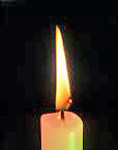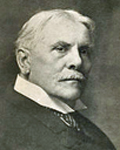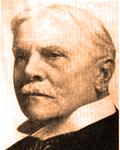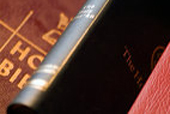RIGHTLY DIVIDING THE WORD OF TRUTH
Dr. Cyrus Ingerson Scofield Chapter
5:
THE FIVE JUDGMENTS "The purpose of this pamphlet is to indicate
the more important divisions of the Word of truth."
The Introduction and previous chapters of Rightly Dividing
may be accessed via links in our
Library.
In
this pamphlet, Dr. Scofield outlines some basic and very important distinctions in Scripture that must be acknowledged for proper understanding. Among these are distinctions that are of particular concern to the messianic community. Perhaps the two most important distinctions in this regard are those between Israel and the Church and between the various ages in God's dealings with mankind, the latter of which are often referred to as "dispensations," each of which has been initiated by a covenant that radically altered God's expectations of those with whom He made the covenant and with those who subsequently entered into it. Many reject the doctrine of dispensationalism, often on the grounds that it was invented by C.I. Scofield, a late eighteenth - early nineteenth century American minister. By the same token, many have rejected the doctrine of salvation by grace alone through faith alone on the same grounds: It was invented by Luther. Of course, Luther didn't invent the doctrine; it was in Scripture all the time. Similarly, Scofield didn't invent dispensationalism; it was in Scripture all the time. He merely brought it to the notice of millions, particularly through The Scofield Reference Bible, first published in 1909. Furthermore, there were many before him that recognized distinctions between the ages and developed the concept to varying degrees, at least as far back as Justin Martyr (A.D. 110-165) - virtually on the heels of Paul, who so copiously expounded on the subject. So there really was an unbroken line, or virtually unbroken line, of church leaders and theologians who recognized these "dispensations." In 1885, Scofield issued Rightly Dividing the Word of Truth, a pamphlet that "set the direction for his teaching and, through numerous editions, the agenda for a major segment of American fundamentalism."1 With this Shofar, the AMC is pleased to continue presenting the entirety of Rightly Dividing the Word of Truth, a concise aid that will help us in rightly dividing the word of truth (2 Timothy 2:15). - ed.
 | RIGHTLY DIVIDING
THE WORD OF TRUTH |  | 
C.I. Scofield
|
*
Chapter 5:
THE FIVE JUDGMENTS
"The Scriptures
speak of five judgments,
and they differ in four general respects:" |
The
expression "general judgment," of such frequent occurrence in religious
literature, is not found in the Scriptures, and, what is of more importance,
the idea intended to be conveyed by that expression is not found in the
Scriptures.
Dr. Pentecost well says:
| It is a
mischievous habit that has led the Christian world to speak of the
judgment as being one great event taking place at the end of the
world, when all human beings, saints, sinners, Jews and Gentiles, the
living and the dead, shall stand up before the great white throne and
there be judged. Nothing can be more wide of the teaching of the
Scriptures. |
The Scriptures speak of five judgments, and they differ in four general
respects: as to who are the subjects of judgment; as to the place of
judgment; as to the time of judgment; as to the result of the judgment.
THE
JUDGMENT AS TO BELIEVERS
Their sins have been judged.
Time: A. D. 30.
Place: the cross.
Result: death for Christ: justification for the believer.
And he bearing his cross went forth into a place called the place of a
skull, which is called in the Hebrew, Golgotha: Where they crucified him.
(John 19:17-18).
Who his
own self bare our sins in his own body on the tree . . . .
(I Peter 2:24).
For
Christ also hath once suffered for sins, the just for the unjust, that he
might bring us to God.
(I Peter 3: 18)
Christ
hath redeemed us from the curse of the law, being made a curse for us: for
it is written, Cursed is every one that hangeth on a tree.
(Galatians 3:13)
For he
[God] hath made him [Christ] to be sin for us, who knew no sin; that we
might be made the righteousness of God in him.
(2 Corinthians 5:21)
But now
once in the end of the world hath he appeared, to put away sin by the
sacrifice of himself.
(Hebrews 9:26)
When he
had by himself purged our sins
. . . .
(Hebrews 1:3)
There is
therefore now no condemnation to them which are in Christ Jesus, who walk
not after the flesh, but after the Spirit.
(Romans 8:1).
THE
JUDGMENT OF SIN IN THE BELIEVER
Time: any time.
Place: anywhere.
Result: chastisement by the Lord, if we judge not ourselves.
For if we would judge ourselves, we should not be judged. But when we are
judged, we are chastened of the Lord, that we should not be condemned with
the world.
(I Corinthians 11:31-32)
If ye
endure chastening, God dealeth with you as with sons; for what son is he
whom the father chasteneth not?
(Hebrews 12:7).
(See also I Peter 4:17; 1 Corinthians 5:5; 2 Samuel 7:14-15; 2 Samuel
12:13-14; 1 Timothy 1:20.)
THE
CONDUCT, OR WORKS OF BELIEVERS ARE TO BE JUDGED
Time: when Christ comes.
Place: "in the air."
Result to the believer: "reward" or "loss."
But he
himself shall be saved.
It
is a solemn thought that though Christ bore our sins in His own body on the
tree and God has entered into covenant with us to
remember them
no more
(Hebrews 10: 17), every work must come into judgment. The life, the works of
the believer must be reviewed by the Lord.
|
Wherefore we labour, that, whether present or absent, we may be
accepted of him. For we must all appear before the judgment seat of
Christ; that every one may receive the things done in his body,
according to that he hath done, whether it be good or bad.
~ 2
Corinthians 5:9-10 ~ |
But why dost thou judge thy brother? or why dost thou set a naught thy
brother? for we shall all stand before the judgment seat of Christ.
(Romans 14:10)
It will be observed that both of these passages are limited by the context
to believers. In the first, the apostle speaks of us as in one of two
states: either we are at home in the body and absent from the Lord, or
absent from the body and present with the Lord - language which could not be
used of unbelievers.
Wherefore we
make it our aim
to be well-pleasing unto the Lord,
for we must all
be made manifest
(2 Corinthians 5:8-9).
In the other passage the words "we" and "brother" again limits it to
believers. The Holy Spirit never comingles the saved and the unsaved. Then,
lest it should seem incredible that a blood-cleansed saint could come into
any judgment whatever, he quotes from Isaiah to prove that
every knee
shall bow
[Romans 14:11 quoted from Isaiah 45:23], and adds,
So then every
one of us shall give account of himself to God
[Romans 14:12].
The following passage gives the basis of the judgment of works:
| For
other foundation can no man lay than that is laid, which is Jesus
Christ. Now if any man build upon this foundation gold, silver,
precious stones, wood, hay, stubble: every man's work shall be made
manifest: for the day shall declare it, because it shall be revealed
by fire; and the fire shall try every man's work of what sort it is.
If any man's work abide which he hath built thereupon, he shall
receive a reward. If any man's work shall be burned, he shall suffer
loss; but he himself shall be saved; yet so as by fire.
~ I
Corinthians 3:11-15 ~ |
The following passages fix the time of this judgment:
For the Son of
man shall come in the glory of his Father, with his angels: and then he
shall reward every man according to his works
(Matthew 16:27).
And thou shalt
be blessed; for they cannot recompense thee: for thou shalt be recompensed
at the resurrection of the just
(Luke 14:14). (See I Corinthians 15:22-23.)
|
Therefore judge nothing before the time, until the Lord come, who both
will bring to light the hidden things of darkness, and will make
manifest the counsels of the hearts: and then shall every man have
praise of God.
~
I
Corinthians 4:5 ~ |
But how comforting it is, in view of that inevitable scrutiny of our poor
works, to learn that in His patient love He is so leading us and working in
us now that He can then find something in it all for which to praise us.
Behold,
I come quickly; and my reward is with me, to give every man according as his
work shall be.
(Revelation 22:12)
Henceforth there is laid up for me a crown of righteousness, which the Lord,
the righteous Judge, shall give me at that day.
(2 Timothy 4:9)
For the place of this judgment, see I Thessalonians 4:17 and Matthew
25:24-30.
THE
JUDGMENT OF THE NATIONS
Time: the glorious appearing of Christ (Matthew 25:31-32; Matthew
13:40-41).
Place: the valley of Jehoshaphat (Joel 3:1-2,12-14).
Result: some saved, some lost (Matthew 25:46).
Basis: The treatment of those whom Christ there calls,
my brethren
(Matthew 25:40-45; Joel 3:3,6- 7). These
brethren
we believe are the Jewish remnant who shall turn to Jesus as their Messiah
during "the great tribulation" which follows the taking away of the church
and is terminated by the glorious appearing of our Lord (Matthew 24:21-22;
Revelation 7:14; 2 Thessalonians 2:3-9). The proof is too extensive to be
put forth here. It is evident, however, that these
brethren
cannot be believers of this dispensation, for it would be impossible to find
any considerable number of Christians who are so ignorant that they do not
know that offices of kindness to believers are really ministries to Jesus
Himself.
As this judgment of the living nations is sometimes confounded with that of
the great white throne in Revelation 20:11, it may be well to note the
following contrasts between the two scenes.
The living nations will be characterized by the following: no resurrection;
living nations judged; on the earth; no books; three classes - sheep, goats,
brethren;
time, when Christ appears. The great white throne will be characterized by
the following: a resurrection; "the dead" judged; heavens and earth fled
away; "books were opened"; one class: "the dead"; after He has reigned one
thousand years.
The saints will be associated with Christ in this judgment and hence cannot
be the subjects of it. (See I Corinthians 6:2; Daniel 7:22; Jude verses
14-15.)
In truth, the judgment of the great white throne and the judgment of the
living nations have but one thing in common: the Judge.
THE
JUDGMENT OF THE WICKED DEAD
Time: a determined day, after the millennium. (Acts 17:31;
Revelation
20:5,7).
Place: before the great white throne. (Revelation 20:11)
Result: Revelation 20:15.
Some may be troubled by the word "day" in such passages as Acts 17:31 and in
Romans 2:16. See the following passages, where "day" means a lengthened
period: 2 Peter 3:8; 2 Corinthians 6:2; John 8:56. The "hour" of John 5:25
has now lasted more than eighteen hundred years.
The Scriptures speak, also, of a judgment of angels (I Corinthians 6:3; Jude
verse 6; 2 Peter 2:4). Luke 22:30 probably refers to judges as under the
theocracy - an administrative office, rather than judicial. (See Isaiah
1:26.) * ENDNOTES
1. W.N. Kerr, "Scofield, Cyrus Ingerson," Evangelical Dictionary of Theology, 1992 ed. *
Dr. Cyrus Ingerson
Scofield (1843-1921) was an attorney,
evangelist, Congregational minister and writer.
Rightly
Dividing the Word of Truth is
republished by permission of www.BibleBelievers.com,
where other fine articles
by Scofield and others may be found. |
*
Return to Home Page

|




